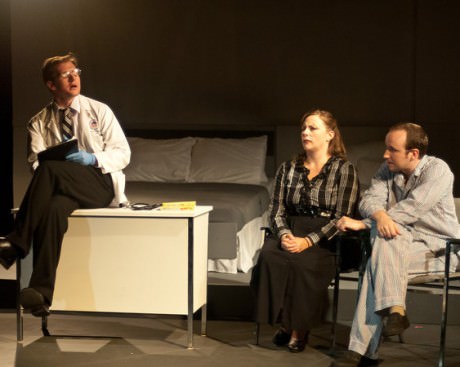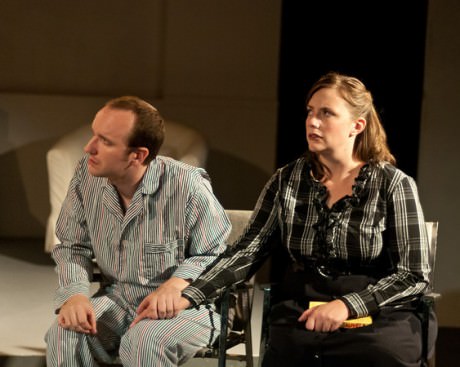It is a common misconception that there are five stages of grief that a person can cycle through when coming to terms with something as severe as a terminal illness. Denial, anger, bargaining, depression, and acceptance. The lesser-known, or perhaps taboo sixth stage is lust. And Paula Vogel’s The Baltimore Waltz is laced heavily with the stuff. Silver Spring Stage officially starts their 2013/2014 season with this poignant and moving drama that is infused with uproarious moments of parody and humor, as well as the blatant undertones that at times threaten to become overtones of sexual frustration and lubricity. Directed by Bob Scott, this production is a well-crafted exploration in coping; the fantasies we construct in our minds to ease the grief we cannot accept in reality.

A good show, whose basic costume and set design are left simplistic enough to let the words of the playwright and the talent of the actors speak for themselves, is augmented by a cleverly crafted soundtrack. Sound Designer Joseph Coracle understands this concept and creates an aurally impressive track that highlights key moments without detracting from their intensity. The opening scene in the darkness is particularly jarring and comes full circle when similar sounds echo at the end of the production; a very fitting soundscape for Vogel’s work. Coracle also selects perfect thematic music to present many of the ‘third man’ characters that appear throughout the production, each adding a subtle hint of excitement to the arrival of a new persona.
The tightly crafted chemistry among the three main players of the cast is a testament to Director Bob Scott’s understanding of Paula Vogel’s uniquely twisted style. The faint hint of inappropriate incestuous ties between Carl and Anna ghost through the two actors physicality as well as their mannerisms and vocal exchanges. Scott toes the line of making the audience wonder; a surefire ability to have when it comes to Vogel’s convoluted relationships. Scott also does an excellent job of pacing the show as it runs long with no intermission; completely unnoticeable as the plot builds, the characters grow, and ultimately the show ends on a very jarring yet startlingly emotional conclusion.
Carl (Joseph Coracle) as the second character introduced, is a curious study in balancing the stereotype of a flamboyant homosexual male with childlike innocence and adult understanding. The play revolves around little pockets of pinnacle moments, each building in intensity, albeit a fraction at a time, and Coracle shifts the dynamic for these scenes of involved focus. His physical intimacy with Anna is open and well reciprocated; a gentle yet naïve sense of love and tender affection shared between them, even if it creates a discomfort in the atmosphere knowing that the characters are brother and sister. The defining moment of Coracle’s performance is his teary-eyed speech given about Jojo the rabbit; the most grounded emotional piece of text his character delivers. Richly playing every heartfelt emotion in that moment, Coracle focuses the audience’s attention to the darker roots of his childhood; presenting total understanding for how his character evolved to its present state.
Anna (Andrea Spitz) is an emotional character that has many more moments of emotional outburst and display than Carl’s character. Spitz gives a thoroughly well-rounded emotional performance, finding the juxtaposition between careless and caring too much somewhere in the depths of the emotional turmoil of her character. During the run down of the stages of grief she breaks each one into a distinctive expression, be it vocally or physically, and relays the character’s emotional instability in those vulnerable moments with an honest passion. Her moments of shared intimacy with “Third Man” feel organic, particularly the French pillow talk scene where the whole moment thrives with a hum of tender sweet sensuality.

The ringer in this production is Third Man (Henry LaGue). Playing in the upward of a dozen different characters LaGue makes vocal, physical, and emotional distinctions between each and every one of them, his most impressive feat by far being the constant turnover of his near-flawless accents. Having a mastery on both French, German, and Dutch sounded characters, LaGrue presents the most vivacious character portraits in the production. His moment as the little Dutch boy involves such a serene and vivid retelling of a story long ago that it is difficult not to hang on his every word. When playing the angry German who is swayed by sexual revolution his voice and body go rigid and command a sharp presence. There’s even some humor to be had by LaGue when he portrays the barking mad Venetian doctor with a frantic physical twitch, and an arm that spastically responds as if it were a separate character all together. LaGue makes the production a smashing success tying together the emotional promiscuity of Anna, the tragic confusion of Carl and overall creates a sense of existence for their story. Playing every other character in the show, LaGue showcases a rare talent to embody several distinct characters at once. It’s a real treat to behold.
Running Time: One hour and 50 minutes, with no intermission.
The Baltimore Waltz plays through October 12, 2013 at Silver Spring Stage— 10145 Colesville Road in Silver Spring, MD. For tickets please call the box office at (301) 593- 6036 or purchased them online.
LINK
An Interview with the Director and Cast Members of Silver Spring Stage’s ‘The Baltimore Waltz’ by Lennie Magida





